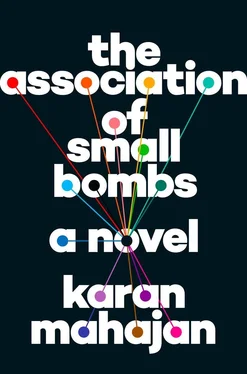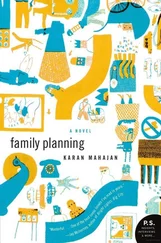“You’re spending your money too,” Afsheen said. “We should at least talk to them.”
“What, so you can accuse me of being pushy? I don’t want to. I want to follow the law of the land this time.”
But he was only being petulant, both Afsheen and Mansoor knew. He would come around eventually. He was famous for always saying no and then coming around. So the family was in a good mood when Ayub called.
“Tell him to come today itself,” Sharif said when Mansoor informed him about Ayub’s request. Even he, Sharif, could barely suppress his good mood.
How guilty he’d felt in the past few months! Guilty about having made such a big mistake with the family savings and guilty about not letting Mansoor return to the U.S. Actually, the reasons for making Mansoor stay were not only financial. Had they wished to continue his education abroad, they would have found a way — Sharif had enough goodwill with his fellow Muslim businessmen to take loans — no, he’d kept Mansoor back for the sake of his wife. Though she had always been eager for her son to study in the U.S., she’d become distraught after his departure, and this despairing state had been exacerbated by the news that Muslims were being targeted and mistreated in the U.S. “But he’s on the West Coast,” he said. “And on a campus what can happen?” To which his wife had responded by finding a clipping in a newspaper of a Muslim student beaten up in Berkeley. “It’s one incident,” he said, though he knew he was losing the debate.
Over time, though, he had begun to regret sending Mansoor to the U.S. He had one son. He’d almost died at the age of twelve — suffered a trauma few people experience in their lifetimes. Why set out to lose him again? So, when Mansoor came back quite suddenly one winter, he thought of ways to broach the subject with him, considered (to use the language of consulting) presenting him with a package of incentives to stay. The unfolding of the property drama was propitious in at least one way, then: he could act as if he were leaning on his son, as if he needed his help in this difficult emotional and financial time — oh, it was underhanded, opportunistic; he knew that nothing came of such behavior, but what could he do? He didn’t feel guilty except late at night when he feared he might be punished in some exceptional way for keeping his son home: Mansoor might die in a car crash, or some other tragedy more obviously native to India rather than the U.S. Twenty-five years of marriage and Afsheen and her hypochondria have rubbed off on me! And he banished the thought from his head and tried, in the way he knew best, to be close to his son, squeezing his shoulders, mussing his hair, hearing him talk. Unlike his wife, he had no desire to interfere in Mansoor’s development; he felt only that he should be present for the stages his son was passing through.
He considered Mansoor’s friendship with Ayub, a young intelligent boy from the provinces, another stage. “Send him over today itself,” he told his son. “I’m in the office all day. My meetings with the PearlPET people got canceled.”
________
When Ayub heard the news from Mansoor, he was overjoyed, and yawned with a weird, thrilling happiness. Which terrorist interviews for a job on the day he sets off a bomb? He left the hotel in a DTC bus, drowsing in the mottled sunlit look of the city. It was early afternoon and it appeared that afternoon might never end. Everyone dropped beneath trees or awnings, the bus was puffed full with people like a patila of rice, young men hung out of every opening, and God only knew how they were holding the hot metal — instinctively, Ayub remembered moments spent on swings as a child when he’d come to Delhi on visits to see relatives. These swings were among the most exotic things about Delhi — entire structures made for play! Nothing of the sort existed in Azamgarh, even in those days when the buildings outnumbered the mountains of trash and slush. And yet, when he remembered the swings and the playgrounds of Children’s Park, with their rectangular rusted ladderlike fixtures, what he recalled was the feeling of burning metal against his skin and a lacerating jolt of static that sent him leaping off the jungle gym. The bus lurched like a person weighed down with bags. The muscles of the people in the vehicle were aligned, rippling in unison.
What if a bomb goes off now? he wondered. And I am finished here itself, never to have a chance to follow through? When the bus dropped him off in a puddle outside the Surya Sofitel hotel he felt an acute sense of loss.
Zakir Nagar, Jamia, Sarai Jullena, New Friends Colony, Community Center — these were parts of South Delhi he knew well; most of the Muslims from his group lived in these areas and he himself had lived in Batla House when he’d moved to Delhi. Being back home, or in the vicinity of home, set his nerves tingling. He was overwhelmed with sentiment for his youth here, the time he’d spent showing Tara around — Tara, who’d grown up in Delhi but admitted she knew nothing about Muslims; there had been no Muslims at the prestigious Delhi Public School where she’d studied — and he kept looking at the women in the fevered light of afternoon and thinking they were his former love. A city of a thousand Taras! That was Delhi. He passed through the door of a nondescript building and up some stairs artfully covered in paan spit and came to Sharif’s office.
“You’re early,” Sharif said, surprised; he had not been expecting him. “Come, come. God, it’s hot outside for October, no? Look at how you’re sweating. Will you have water? Mohsin, yaar , bring water for sahib.”
The office wasn’t much to look at — one of those seedy low-roofed places where every piece of furniture is covered in a layer of dirt or a plastic sheet and the computers and printers have long turned a milky brown or gray.
As Sharif spoke, Ayub smiled and held his chin in his hand and pretended hard to listen. Then, suddenly, Sharif was pointing at him. “You’re OK? Your eyes are very red. Do you have a fever? You look very tired — you have dark circles under your eyes.”
Not just that — Ayub was out of breath. “I’m OK, uncle — it’s very hot outside,” he managed.
“Where are you staying now?”
“With a relative,” he lied. “Nearby only, in Jamia. Batla House.”
“They’re giving you enough to eat, I hope.” He smiled, his large, hollow teeth visible through his graying beard.
“Yes, uncle,” he said, trying to smile, but failing to fall back into the natural stream of conversation.
“You brought your biodata?”
Ayub stiffened.
“It’s not that important,” Sharif said. “You’re the friend of my son and that’s the most important thing. There’s nothing in plastics that can’t be taught. You’re from Lucknow, right?”
They’d had this conversation many times at dinner and Ayub had long since learned that Sharif was not a good listener. “Actually, Azamgarh, uncle.”
Sharif nodded. “Yes, yes, Azamgarh. Named after Azmi — the father of your Shabana Azmi, no?”
This wasn’t quite right, but Ayub did not disagree. “Yes, uncle — actually we’re very distantly related to them. Even the train to Azamgarh was named after him. My great-grandfather was his cousin and a freedom fighter. He was quite a famous poet. But after him, the family went into decline. I have many cousins — the smart ones are in the Gulf, but most are uneducated. I don’t know how such a rapid decline happened in two generations. Now there’s just the name, nothing else. The whole town lives off the name.” Ayub was surprised at his own confession. The A/C made the place excessively cold. Maybe he did have a fever.
But Sharif was not thinking about Ayub or his family. He was thinking, rather — after a long time — of the Khuranas, of how similar Ayub’s story was to that of Vikas’s family, how so many great families had come crashing down after independence, as if the end of the revolution had robbed them of their raison d’être and they were condemned to forever looking back at towering figures from the previous era. Had these figures even been that great? Or was independence like any industry in India in which a bunch of mediocre entities with money cornered the market and congratulated themselves endlessly? Sometimes, in his darker moods, Sharif felt there had been no great figure in this country ever, that it had always just rolled along, a moody rock, a sticky mess of fictions and chaos and egos — like this fellow: Was his grandfather really great? Or had the mediocrity of the present made him think so?
Читать дальше












